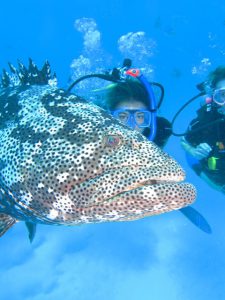 University of Florida College of Agricultural and Life Sciences alumna Shelby Thomas earned her undergraduate degree in marine sciences in 2017, her master’s degree in interdisciplinary ecology in 2018 and is currently working towards her doctorate in fisheries and aquatic sciences at the University of Florida. She also works for Ocean Rescue Alliance, a non-profit organization that combines science, art, education, research, conservation, restoration and the community together to restore marine environments.
University of Florida College of Agricultural and Life Sciences alumna Shelby Thomas earned her undergraduate degree in marine sciences in 2017, her master’s degree in interdisciplinary ecology in 2018 and is currently working towards her doctorate in fisheries and aquatic sciences at the University of Florida. She also works for Ocean Rescue Alliance, a non-profit organization that combines science, art, education, research, conservation, restoration and the community together to restore marine environments.
What brought you to CALS and your department? What first sparked your interest in your major?
I have always been passionate about marine conservation, finding that the University of Florida had a marine science major aligned with marine research sparked my interest. Along with the further ability to pursue coral restoration and different fishery-related conservation strengthened my desire to enter this program. Since coming to UF I have been involved with more than 15 different restoration projects that range in various marine environments such as seagrass, scallop, oyster, and coral restoration.

Was there a particular CALS faculty/staff or mentor that was influential in your career path?
This would be a hard selection as I have had the pleasure to meet so many influential mentors and incredible teachers at the University. To name a few Drs. Shirley Baker, Nicolas Funicelli, Bill Lindberg, Anthony Adenoro, and Katie Sieving. I have certainly found ample opportunities to develop professionally, connect, and really build a strong network of relationships from these mentors that have helped me post-graduation with graduate school and career choices. The added value of each instructor I have had really shows their passion and dedication to their work, I have always been thankful for the people I have been fortunate to work with at UF.
What do you find to be the coolest/best part of your job/career?
The best part of my career is the ability to impact people and conserve our marine environments. I get to further conduct effective marine restoration research while also connecting local communities in engaging ways. I also have the opportunity to potentially shift the public’s perception and relationship to the ocean, striving to promote a more environmentally aware and responsible community.
“This work has enabled me to work with diverse organizations and communities to work to create more sustainable marine conservation and restoration initiatives.” – Shelby Thomas
What are some exciting projects you have worked on in the course of your career?
 One exciting project we are working on now is to out plant corals on natural reefs using some of our innovative restoration technologies such as the Coral Lok. The Coral Lok is a device that increases coral out planting efficiency. Threaded frag plugs are implemented into a variety of Coral Lok modules and receivers which enables 15-20 corals to be out-planted at one time. Each Coral Lok and module is created with eco-friendly materials designed to eliminate the use of plastic and epoxy in restoration practices. ORA holds five different Coral Lok module designs that are selected based on restoration focus or species. We are now working with NOAA, CRF, Secore International to out plant our Coral Lok mini habitat modules onto natural reefs. We hope this will advance restoration efforts enabling us to out plant coral more quickly and efficiently. Some other projects include creating artificial reefs that incorporate biodiverse fish habitat, the Coral Lok to out plant coral, and art to create unique diving locations.
One exciting project we are working on now is to out plant corals on natural reefs using some of our innovative restoration technologies such as the Coral Lok. The Coral Lok is a device that increases coral out planting efficiency. Threaded frag plugs are implemented into a variety of Coral Lok modules and receivers which enables 15-20 corals to be out-planted at one time. Each Coral Lok and module is created with eco-friendly materials designed to eliminate the use of plastic and epoxy in restoration practices. ORA holds five different Coral Lok module designs that are selected based on restoration focus or species. We are now working with NOAA, CRF, Secore International to out plant our Coral Lok mini habitat modules onto natural reefs. We hope this will advance restoration efforts enabling us to out plant coral more quickly and efficiently. Some other projects include creating artificial reefs that incorporate biodiverse fish habitat, the Coral Lok to out plant coral, and art to create unique diving locations.
What advice would you give to students who are interested in the same major/career path as you?
There is such an opportunity in this career to be creative and explore things that inspire you. My advice would be to pursue your passions and what inspires you. I recommend trying new opportunities and taking advantage of all of the resources at the university that enables you to get experience and explore your field of work. Find what you love and do that!
Marine Sciences students study oceanography, statistics, fisheries and aquatic sciences, and invertebrate biodiversity. Students can focus elective courses on ecology, organismal biology, economics, human dimensions, and/or quantitative or professional skills. Find a CALS major that suits your interests by taking our majors quiz. You can also find information regarding our undergraduate and graduate programs on our website. Questions for Shelby Thomas about her experiences in the Marine Science Department should be directed to shelby.thomas.21@ufl.edu.
 0
0
